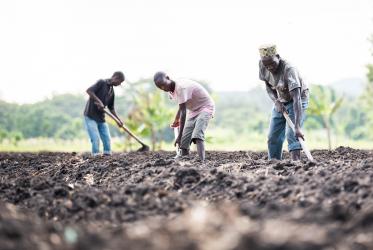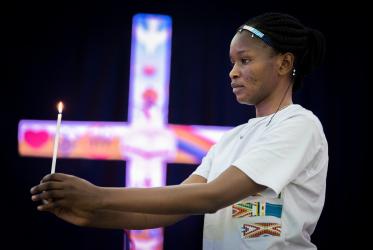Ecumenical diakonia means complementing each other in what we do best: serving our communities, thus bringing visible church unity to the world, agreed participants at an Ecumenical Strategic Forum on Diakonia and Sustainable Development convened by the World Council of Churches (WCC) last week.
More than 100 representatives from churches, church agencies and specialized ministries across the globe met in the Ecumenical Centre in Geneva from 3-6 October to seek a common vision for the churches’ engagement in diakonia and sustainable development and strengthen their ability to collaborate.
Sharing the existing practices of ecumenical diakonia, Samer Laham, member of the Middle East Council of Churches and a regional director of Ecumenical Relief Services, noted that bond of cooperation between churches is the expression of church unity. “It can be seen today in many diaconal activities on the ground in countries that have been living under volatile conflicts like Syria and Iraq”, he acknowledged.
Caring for refugees from Syria has been a priority of the Armenia Inter-church Round Table Foundation as well, said foundation director Dr Karen Nazaryan. “Since 2014 we are consistently helping refugees from Syria to find a safe place in Armenia, supporting their integration into Armenian society economically, socially and spiritually.” More than 2,000 Syrian refugees have benefited from the program, and this support is possible thanks to collaboration of Armenia Round Table Foundation with ACT Alliance and its member agencies, says Nazaryan.
Rev. Dr Kjell Nordstokke, one of the authors of the newly developed “Ecumenical Diakonia” document presented during the forum, advocated for assets-based ecumenical work - an attitude that would bring forward what each partner is already doing best along with a courageous move to be widely open to serve the other.
Lyn van Rooyen, executive director of the faith-based non-governmental organization CABSA in South Africa, shared that her organization deliberately works non-denominationally in training and equiping faith leaders to respond to the HIV challenges.
“We work from a competence or asset based perspective and realised very early on that collaboration and cooperation, also with other faith communities, is a very important asset”, says van Rooyen. “In our training we often have representatives from many different denominations and faith traditions and significant community response is often initiated when denominational barriers are broken down.”
In South Africa faith communities often start collaborating when there is a compelling need and limited resources, adds Lyn van Rooyen. “In these situations faith communities, compelled by the love of Christ, find new and creative ways to respond to seemingly overwhelming crises.”
Sustainable development goals adopted by the member states of United Nations and a global civil society provides renewed strength for the diakonia and advocacy work of churches and their ministries, thinks Ingrid Næss-Holm, climate advisor of Norwegian Church Aid.
“When we advocate for climate justice, when we work with partners to end gender-based violence and when we provide humanitarian assistance in times of crises - it is all diakonia in practice”, says Næss-Holm. Norwegian Church Aid has been addressing the issues climate justice, economic justice, access to water, sanitation and hygiene, peace building in many places of the world for a long time. “However the sustainable development goals give us a renewed strength and legitimacy to take this work forward together with existing partners and new allies”, envisions Næss-Holm.
Speaking of the outcomes of the forum, it is impossible to overlook the presented framework for further cooperation, the Ecumenical Diakonia document, acknowledged as a common ground and a solid basis for conversation, bringing churches and other actors in diakonia and humanitarian work at one table.
For Roel Aalbersberg, member of the WCC’s Commission of the Churches on International Affairs, the most important outcome of the forum was the introduction and discussion on the Ecumenical Diakonia document. “In 2014 the Malawi Consultation had called for the creation of such a policy paper that could be shared by churches and specialized ministries alike. From now on we will have a common framework for our diakonal and development work”, says Roel Aalbersberg. “It is a major step forward in our mutual relationships!”
“It was very inspiring to see the unity between WCC, ACT and LWF (Lutheran World Relief) shown by the three secretary generals and reflected in the discussions”, says Næss-Holm, reflecting on the days of the forum.
A strong and united ecumenical family that puts diakonia into action can indeed make a huge difference in addressing today's injustices and achieving the sustainable development goals. “When we add the interfaith dimension - we will be even stronger”, adds Næss-Holm.
The Ecumenical Strategic Forum gathered participants from churches, councils, communions and specialized ministries, involving national, regional and global ecumenical actors. The primary objective of the forum was to strengthen ecumenical collaboration on diakonia and development; stimulate strategies for leveraging national impact; and provide a road map for the ecumenical accompaniment of the 2030 agenda for sustainable development.
Ecumenical diakonia: sharing God’s gifts at all tables
Responding to the world’s challenges: forum shapes strategy on diakonia
Photos from the Ecumenical Strategic Forum











